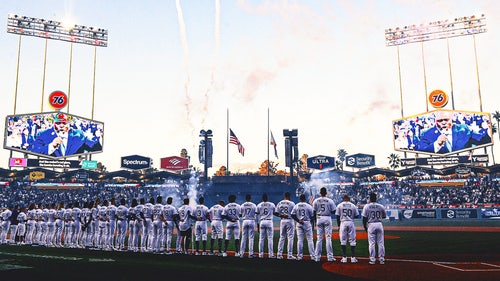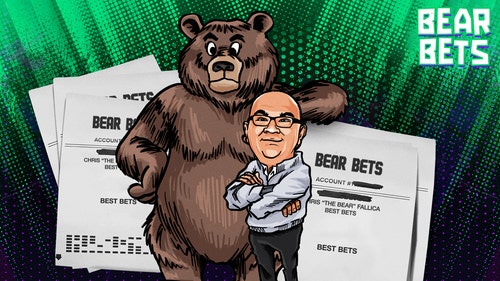
Rafael Devers has earned extension from Red Sox
By Jordan Shusterman
FOX Sports MLB Writer
Consider me fully onboard the "Extend Rafael Devers Hype Train" rolling up and down the greater New England area. The sweet-swinging, 25-year-old third baseman is in the midst of another marvelous season for the Red Sox.
Let’s rewind a year. Last summer, Devers and Xander Bogaerts — the left side of Boston’s infield since 2017 — were both putting together All-Star, Silver Slugger campaigns. While Bogaerts had signed an extension in April 2019, it came with an opt-out following the 2022 season that seemed likely to be exercised. Devers, meanwhile, was still another two years from free agency, but the idea of him playing in another uniform was already starting to creep into Boston fans’ minds.
After watching how the Mookie Betts saga played out, the notion of failing to retain one or both of these infielders was unsettling. And heading into this past offseason, there appeared to be similarly strong cases for both Devers and Bogaerts to be worthy of significant, long-term investment.
Then the Red Sox signed Trevor Story to a six-year, $140 million contract.
In signing Story, Boston signaled that Bogaerts might no longer be in the team's long-term plans. Story remains at second base for now, but he seems like an obvious successor if shortstop Bogaerts does indeed opt out of the remaining three years and $60M on his extension.
Looking ahead, the future of Boston’s infield appears much clearer if we lock in Devers at third base. Consider the top three prospects in Boston’s shallow farm system: Triston Casas (a first baseman in Triple-A), Nick Yorke (a second baseman in High-A) and Marcelo Mayer (a shortstop in Low-A). There’s also Jeter Downs, acquired from the Dodgers in the Betts trade, whose prospect stock has faltered somewhat but who still projects as a useful piece at either shortstop or second base.
Point being, there appears to be a clear successor at all three non-3B infield spots. As such, Devers has emerged as a much more obvious focus for the Red Sox to make the core piece around which to build their infield.
More importantly — and obviously — the Red Sox should want to invest long-term because Devers has been absolutely spectacular in 2022. He has a career-high .981 OPS, he leads the league in both hits and doubles, and he currently sits third in fWAR among position players, behind only Manny Machado and Aaron Judge.
Bogaerts and JD Martinez have been stellar as well, but Devers has been the most consistent driving force as the Red Sox have battled back into the AL wild-card race after starting the season 11-20.
There are some elements of Devers’ offensive profile — namely his below-average walk rate and proclivity to swing at pitches out of the strike zone — that appear concerning when projecting a hitter’s production. But fortunately, Devers is basically a modern-day Vladimir Guerrero — arguably even more so than Vlad Jr. — in that he can do legitimate damage while swinging at pitches that he probably shouldn’t swing at.
Devers’ bat control is so elite that he doesn’t need to wait for a pitch in a certain location for it to be worth swinging the bat. Since the start of 2019, he leads MLB in extra-base hits on pitches outside the strike zone, with 43.
With most hitters with low walk rates and high chase rates, pitchers can exploit their lack of discipline by staying out of the zone and letting the batter get himself out via strikeout or weak contact. But it’s not that simple with Devers, whose unparalleled ability to punish pitches out of the strike zone makes him a special kind of nightmare for opposing pitchers.
Plus, he’s exhibiting nearly identical plate discipline this season (6.8% walk rate, 17% strikeout rate) to what he showed in 2019 (6.4% walk rate, 17.4% strikeout rate), and that worked out just fine. Devers' 2019 was somewhat obscured because the team won only 84 games and defending AL MVP Mookie Betts was still around, but it was a truly historic campaign.
Devers led MLB with 359 total bases, and his 90 extra-base hits were third-most in MLB history by a player in his age-22 season or younger, behind only Joe DiMaggio in 1937 (96) and Alex Rodriguez in 1996 (91). If it wasn’t already obvious that he was destined for superstardom, Devers' 2019 campaign should’ve been taken as a strong hint.
Now, we can gawk at Devers' offensive numbers all we want, but the bat was never in question. Scouts have been projecting Devers to be a special hitter since he was 15 years old. That he has actualized that potential has been a thrill to watch but not exactly a surprise.
What’s always been more of a question is whether Devers could stick at third base for the long haul. In his first five seasons, as the errors piled up and advanced metrics continued to rate him poorly, it seemed like the clock was ticking down to his eventual move across the diamond. While his offensive production would still be plenty sufficient at first base or even DH, the Red Sox knew how valuable it was to have someone of Devers’ offensive potential at third base.
It seems their patience is finally starting to pay off, as Devers has started to demonstrate legitimate improvement on defense this season.
"He made a conscious effort in the offseason to work on his defense as much as he works on his offense," Boston manager Alex Cora said in April. "It’s paying off."
Indeed, not only are we seeing more flashy plays such as this:
But we’re also seeing fewer mistakes from Devers on routine grounders and fewer rushed, inaccurate throws to first base, an issue for him in the past. He might never win a Gold Glove, but most defensive metrics now rate Devers as much closer to average, which you certainly could not say in any previous season. That improvement should only give Boston more confidence that Devers can be their answer at the hot corner for many years to come.
On top of his consistently elite production and particularly clean fit on the roster, Devers is also an overwhelmingly likable personality. His wide range of facial expressions during any given at-bat rivals Juan Soto for the most entertaining batter’s box occupant in baseball, and he always seems to be having a ridiculously good time playing:
He is the kind of player you want to pay to watch, just as much for his childish and endearing on-field persona as for his ability to impact any given game with his talent.
If we can all agree that it's obvious the Red Sox should indeed extend Devers, that leaves one question: What does that extension look like?
Devers reportedly rejected a contract extension offer before the season, with multiple outlets citing that the two sides were very far apart. ESPN’s Jeff Passan suggested in April that the Red Sox offered north of $200 million, but Devers was seeking more than $300 million.
That’s a sizable gap, but it’s also an understandable place for the sides to begin negotiations with Devers still two seasons away from free agency.
Every extension candidate is different, but a few recent extensions — and extension negotiations — might be instructive for what Devers is seeking.
* February 2019: Rockies extend Nolan Arenado for eight years/$255 million ($31.8 million AAV) through his age-35 season.
* July 2020: Dodgers extend Mookie Betts for 12 years/$365 million ($30.4 million AAV) through his age-39 season.
* March 2021: Mets extend Francisco Lindor for 10 years/$341 million ($34.1 million AAV) through his age-37 season.
* February 2021: Padres extend Fernando Tatis Jr. for 14 years/$340 million ($24.3 million AAV) through his age-35 season.
* March 2022: Braves extend Matt Olson for eight years/$168 million ($21 million AAV) through his age-35 season.
* June 2022: Astros extend Yordan Alvarez for six years/$115 million ($19.1 million AAV) though his age-31 season.
Then there’s the big one that hasn't happened: Aaron Judge. Just before Opening Day, Yankees GM Brian Cashman offered some stunningly candid insight into the extension negotiations with the star outfielder, who at that point was one year from free agency — just as Devers will be this upcoming offseason.
Cashman said the Yankees offered Judge a seven-year, $213.5 million contract, which featured a $30.5 million AAV that would’ve edged the $30.4 million AAV on the extension the Dodgers gave Betts in 2020. Judge turned it down, and based on his MVP-level play thus far, that decision is looking rather wise. Still, the Yankees’ offer is another reference point when considering what it takes to extend one of the best hitters in baseball.
Let’s be clear: Judge is a better player than Devers. But Devers is also four-and-a-half years younger than Judge, plays a more valuable position and has proven to be more durable. With that in mind, it makes all the sense in the world that Devers would be shooting for north of $300M and possibly a number higher than what Judge ultimately ends up getting.
Still, we can compare Devers’ extension case to those of recent stars and try to project a number. Does he want an extension that keeps him in Boston through his prime, with a decade-plus-long deal worth more than $300 million? Or does he want a shorter but significant commitment — something like six years, $190 million — that allows him to hit free agency again in his early 30s?
The truth is none of us knows what it’s going to cost for the Red Sox to extend him — only Devers and his agents know that. But what I do know is that he’s more than deserving of a monster payday, and he’s the perfect type of player and personality for Boston to build around over the next decade.
This isn’t about correcting any past mistakes related to Betts or Bogaerts or anything else. It’s about what Devers is now, what he can still become and how perfectly he fits on Boston’s roster moving forward. Whether it's during the season or this winter, the Red Sox should get it done.
It’s simply a no-brainer.
Jordan Shusterman is half of @CespedesBBQ and a baseball writer for FOX Sports. He lives in D.C. but is a huge Seattle Mariners fan and loves watching the KBO, which means he doesn't get a lot of sleep. You can follow him on Twitter @j_shusterman_.










